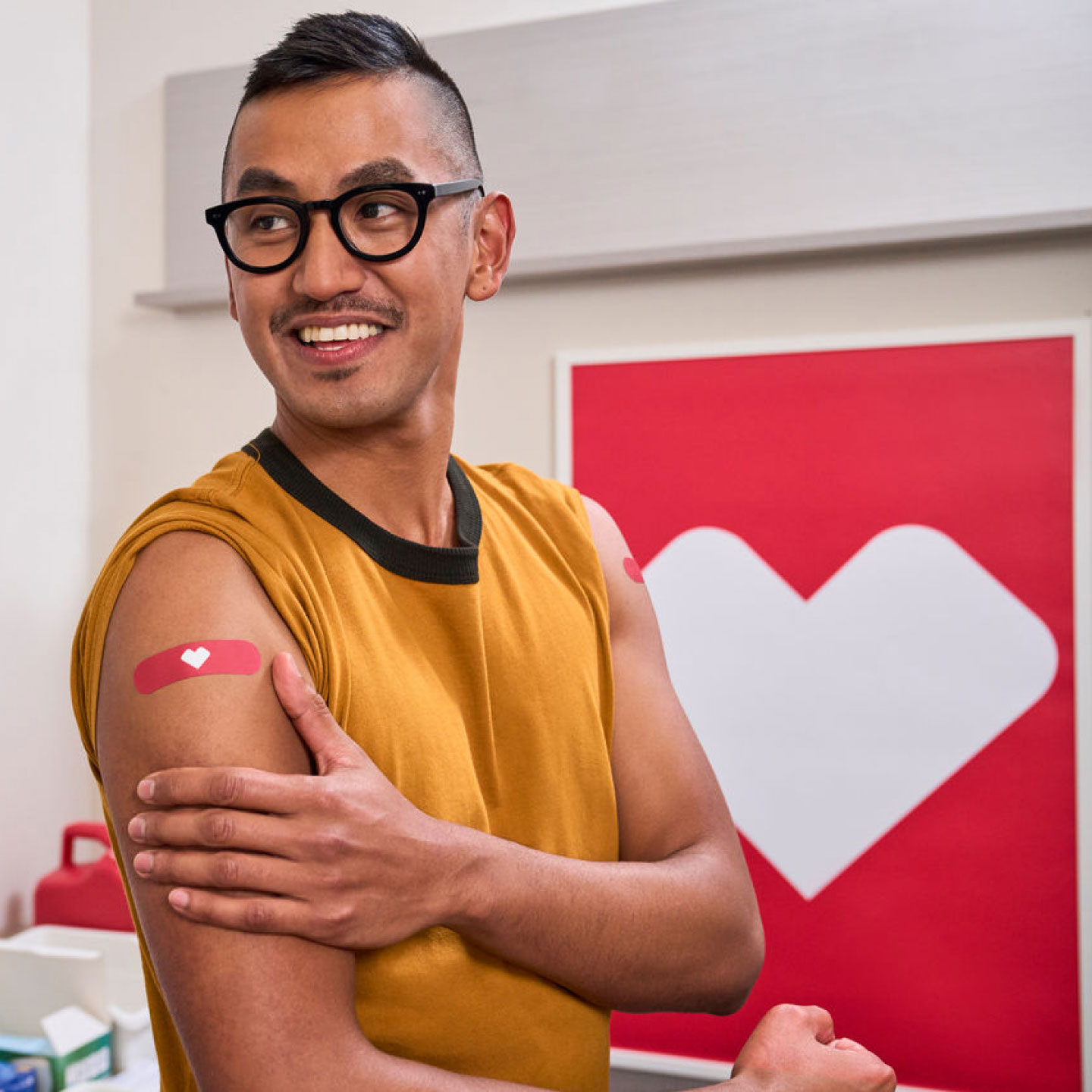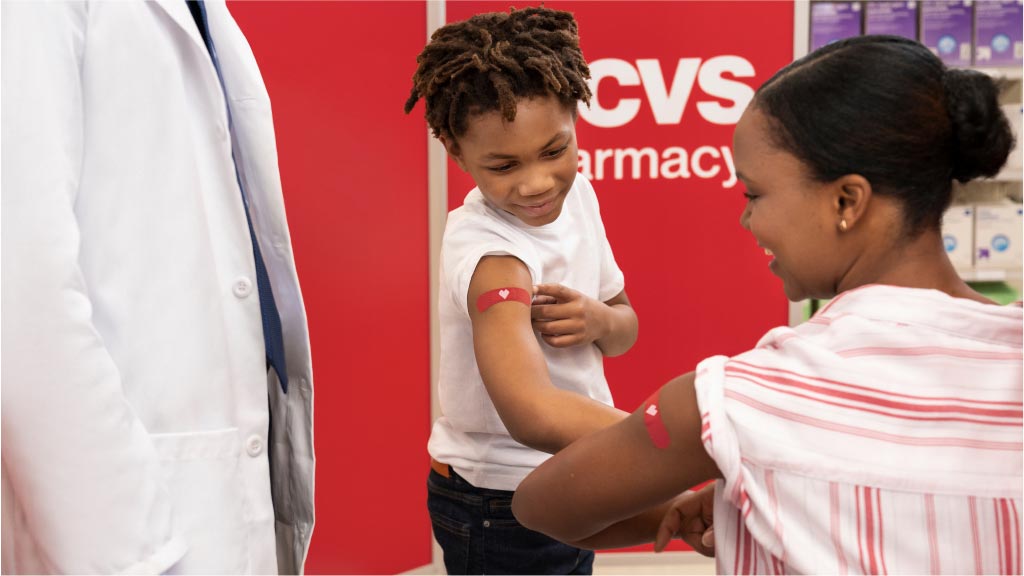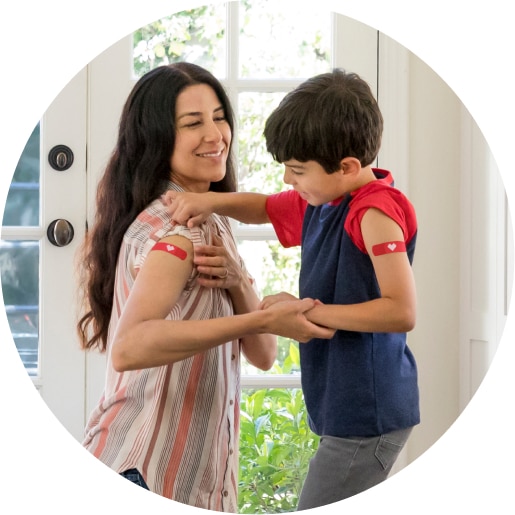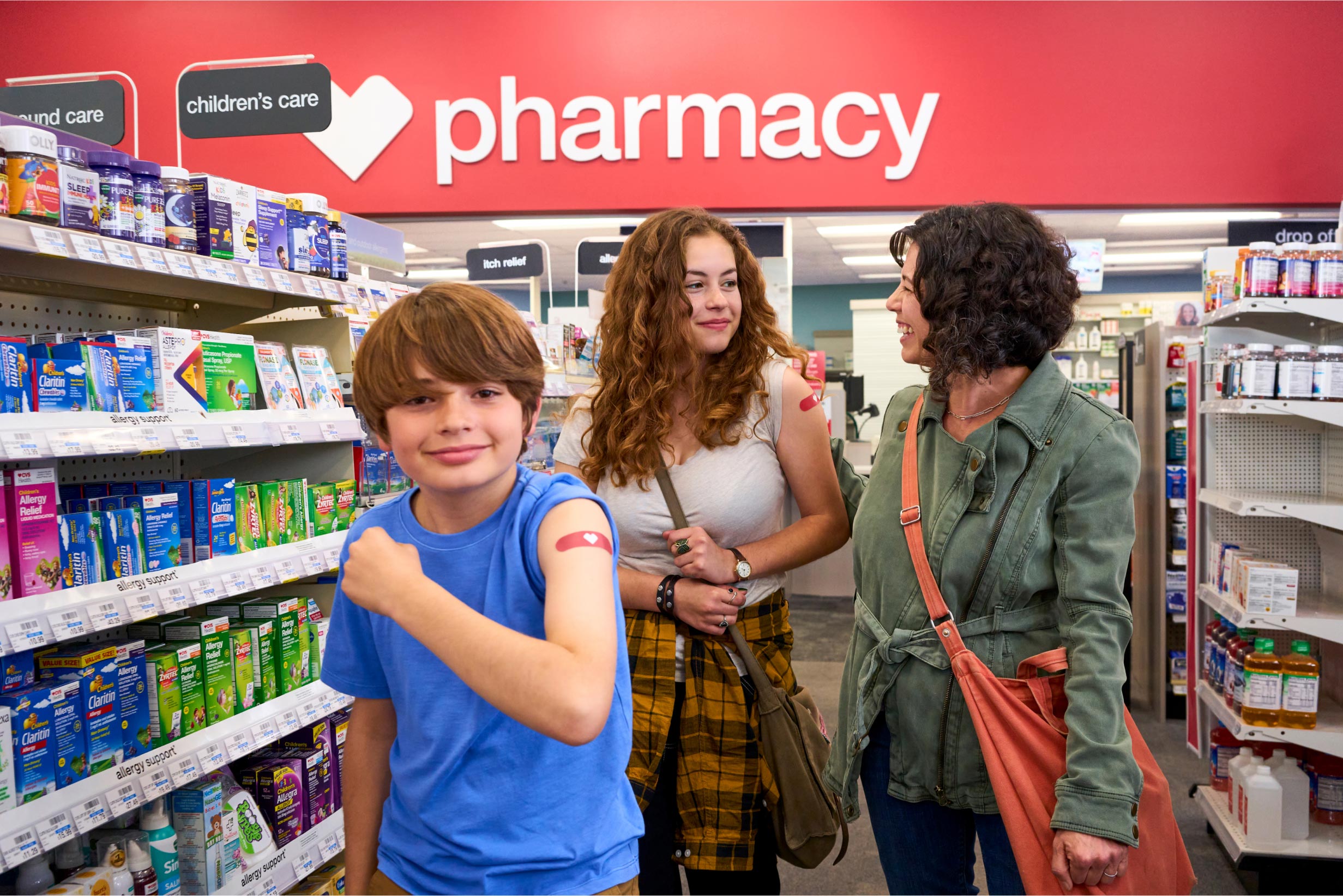Schedule your COVID-19 vaccine today
COVID-19 vaccine is no cost* with most insurance plans if CVS is in network. Exceptions and exclusions apply.
*COVID-19 vaccine is no cost to eligible uninsured individuals through the Health and Human Services (HHS) and Centers for Disease Control and Prevention (CDC) Bridge Access Program.

Important COVID-19 vaccine update
Adults age 65 or older who have already received one dose of the updated 2023 to 2024 COVID-19 vaccine should receive an additional dose at least four months after their previous per the latest guidelines from the Centers for Disease Control and Prevention (CDC).

About the updated COVID-19 vaccine
The updated COVID-19 vaccine closely targets circulating variants. It can help provide protection for you, your family and your friends.
According to guidelines from the Centers for Disease Control and Prevention (CDC), eligible patients can receive an updated COVID-19 vaccine at least two months after their last dose of a COVID-19 vaccine. On February 28, 2024 the CDC recommended adults age 65 or older receive an additional updated 2023 to 2024 COVID-19 vaccine at least four months after their previous vaccination. The CDC also states that the COVID-19 vaccine can be coadministered with the flu vaccine.
The Centers for Disease Control and Prevention (CDC) recommends that everyone age 6 months or older get an updated Pfizer-BioNTech or Moderna COVID-19 vaccine to help protect against serious illness from COVID-19. As an alternative, the CDC also recommends one dose of Novavax COVID-19 vaccine at least two months after the last dose of any COVID-19 vaccine for individuals age 12 or older. CVS® store locations can administer COVID-19 vaccines to patients age 5 or older.
Certain individuals may be eligible for more than one dose of the updated COVID-19 vaccine, depending on their age, previous vaccination history and/or immunocompromised status. On February 28, 2024 the CDC recommended adults age 65 or older receive an additional updated 2023 to 2024 COVID-19 vaccine at least four months after their previous vaccination. Ask your health care provider for more information.
Yes, but not all insurance plans are in network at CVS. The COVID-19 vaccine may be no cost to you at CVS depending on your insurance plan. Insurance plans vary, and your insurance plan determines where you are eligible to receive a COVID-19 vaccination at no cost to you. No-cost COVID-19 vaccines through this program will be available through December 31, 2024.
If CVS is not in network with your insurance plan, please check with your insurance plan — you can choose to receive the COVID-19 vaccine at CVS. However, you will be charged $190.99 for the vaccination. Alternatively, you may contact your insurance provider to determine where you may obtain a COVID-19 vaccination at no cost to you.
COVID-19 vaccine information for children
Should your kids be vaccinated?
Getting a pediatric COVID-19 vaccine can help keep children from getting seriously sick. Consult your health care provider for more guidance and information.

CVS Health’s trusted immunizers
To date, CVS Health® has safely administered over 59 million COVID-19 vaccines.

We can help with side effects
Side effects may occur, but are generally mild. Our practitioners can provide information on how to handle your child’s potential side effects.

We're here to help with your COVID-19 needs
Get treatment for COVID-19 or flu from a licensed CVS® pharmacist
We make vaccinations easy
The vaccines you need, all in one place™
Schedule more vaccines for you and your family, including flu, pneumonia, shingles and more.

Getting the COVID-19 vaccine
CVS Pharmacy follows the most up-to-date federal guidance as it relates to COVID-19 vaccine administration. We offer either the updated Moderna or Pfizer-BioNTech COVID-19 mRNA vaccines for all doses administered to eligible individuals, depending on location, as well as the updated Novavax protein-based COVID-19 vaccine to eligible individuals.
The CDC (Centers for Disease Control and Prevention) recommends updated COVID-19 vaccination for everyone age 6 months or older to better protect you and your loved ones. Specific recommendations may vary by age, previous vaccination history or whether you are moderately or severely immunocompromised. Please talk to your pharmacist or provider or use the digital scheduler at CVS.com® and the CVS Pharmacy app to help determine what’s best for you.
Houston Medical, recognized as a top 20 U.S. hospital in a 2022 to 2023 list by U.S. News & World Report, reported why the new COVID-19 vaccine formulations are a little different from previous boosters. According to Houston Medical, these updated formulations don’t just “boost” protection against particular versions of the COVID-19 virus. Because these new formulations update patient immune systems to recognize the strains of the virus they’re most likely to encounter, they’re called vaccines instead of boosters.
An eligible individual should receive an age-appropriate vaccination. At this time, there is no preference given for one formulation (Moderna or Pfizer-BioNTech) over another. If choosing the protein-based updated Novavax COVID-19 vaccine, individuals not previously vaccinated with any COVID-19 vaccine should receive two doses, administered at least three weeks apart. Patients who are immunocompromised may need additional doses. Please talk to your pharmacist or provider, or use the digital scheduler at CVS.com® and in the CVS Pharmacy® app, to help determine what’s best for you.
As part of the scheduling process on CVS.com, patients are asked to attest that all information provided during appointment setup is truthful and accurate. Some states also require the collection of IDs to verify eligibility. We reserve the right to cancel appointments if it’s determined that information provided for establishing eligibility is not truthful.
The bivalent COVID-19 vaccine and previous authorized COVID-19 formulations are no longer authorized for use. The CDC now recommends that most individuals receive a single dose of the updated FDA (Food and Drug Administration) authorized vaccine, regardless of previous vaccination status.
Scheduling a COVID-19 vaccine appointment
Yes. Appointments may be scheduled at CVS.com or the CVS Pharmacy app. CVS Pharmacy also accepts walk-ins, seven days a week, including during evening and weekend hours.
Yes. Providers may simultaneously administer COVID-19 and flu vaccines.
Currently, CVS Pharmacy locations offering the COVID-19 vaccine to eligible populations have either the Moderna or Pfizer-BioNTech vaccine. All CVS Pharmacy locations also offer the updated Novavax protein-based COVID-19 vaccine. Patients can see which CVS Pharmacy location has which vaccine and appointment availability on CVS.com before scheduling. Patients who are interested in receiving a non-mRNA COVID-19 vaccine (Novavax) should speak with the pharmacist. Novavax is available at all CVS Pharmacy locations subject to local availability.
Where to get the COVID-19 vaccine
CVS.com and the CVS Pharmacy app will be updated to reflect active vaccinating CVS Pharmacy locations.
Yes. Businesses, senior-living facilities, schools, municipalities and other groups may schedule an on-site COVID-19 vaccination clinic staffed by certified CVS Pharmacy immunizers to help make vaccines convenient and accessible to employees, staff, residents and students. On-site COVID-19 vaccination clinics are available in all 50 states, Puerto Rico and Washington, D.C. Learn about or schedule a COVID-19 vaccination clinic.
COVID-19 vaccine safety
COVID-19 vaccines are safe and effective. To date, hundreds of millions of people have safely received a COVID-19 vaccine under the most intense safety monitoring in U.S. history.
According to the Centers for Disease Control, you may have some side effects following administration of a COVID-19 vaccine. Common side effects may include pain and/or tenderness of the arm where you got the shot, headache, fever, chills and/or fatigue.
CVS Health® immunizers include trained pharmacists, pharmacy interns and pharmacy technicians, as well as other qualified health care professionals, depending on state-specific regulations. All CVS Health immunizers are certified according to company requirements, are trained in the administration of immunizations and hold an active CPR (cardiopulmonary resuscitation) certification.
Per guidance from the Centers for Disease Control and Prevention, patients age 5 or older do not have to match the COVID-19 vaccine dose they receive to the brand they received during their primary series or any previous dose(s). For children ages 6 months through 4 years, vaccination with the same COVID-19 vaccine brand is recommended.
Yes. CVS Pharmacy® and MinuteClinic® locations offer COVID-19 vaccines that the Centers for Disease Control and Prevention recommends. People ages 65 years and older should receive the recommended number of dose(s) of updated (2023–2024 Formula) mRNA or Novavax vaccine.
In addition, as we get older, our immune systems tend to weaken over time, putting us at higher risk for certain infections. All adults ages 65 and older should make sure they’re up to date on these vaccines, too:
- Flu vaccine
- Pneumococcal vaccine
- Shingles vaccine (zoster)
- Tdap (tetanus, diphtheria and pertussis, also called whooping cough) or Td (tetanus and diphtheria)
You may need other vaccines based on your age or other factors, too. Talk with your doctor to learn which vaccines are recommended for you. This may include:
- RSV (respiratory syncytial virus) — adults aged 60 years or older should talk to their health care provider about getting a single dose of RSV vaccine
COVID-19 vaccine costs
Yes. CVS Pharmacy is participating in the Centers for Disease Control and Prevention (CDC) Bridge Access Program. This program provides no-cost COVID-19 vaccines to eligible adults without health insurance. No-cost COVID-19 vaccines through this program will be available through December 31, 2024.
If you have insurance that does not include CVS as an in-network pharmacy, we recommend you contact your insurance provider to determine where you may obtain a COVID-19 vaccination at no cost to you. Alternatively, you can choose to receive the COVID-19 vaccine at CVS. However, you will be charged $190.99 for the vaccination.
If you are uninsured, CVS Pharmacy is participating in the CDC's Bridge Access Program. This program provides no-cost COVID-19 vaccines to eligible adults without health insurance.
COVID-19 vaccines for children
Pediatric doses of the Moderna and Pfizer-BioNTech COVID-19 vaccine for ages 5 through 11 are available at select CVS Pharmacy locations. We recommend parents and guardians check CVS.com®, the CVS Pharmacy app to find locations near them with available appointments.
Pediatric doses of the Moderna and Pfizer-BioNTech COVID-19 vaccines for children ages 18 months through 4 years are available at MinuteClinic® locations with appointments available at MinuteClinic.com.
We offer COVID-19 vaccinations to children ages 18 months through 4 years at our national network of MinuteClinic® locations. Our MinuteClinic clinicians, comprising board-certified family nurse practitioners and physician associates, have significant experience providing vaccinations to a younger population and have access to private exam rooms, which helps to make the process easier for kids, parents and guardians.
MinuteClinic providers can only administer the Pfizer-BioNTech and Moderna COVID-19 vaccines to patients ages 18 months and older.
The COVID-19 vaccines available at each MinuteClinic location for eligible adults and children may vary. When you choose a MinuteClinic location to get your COVID-19 vaccine, each location will list the manufacturer of the vaccines they carry. You can check for vaccine manufacturer and other information about each location before scheduling your vaccine visit.
FOOTNOTES AND DISCLAIMERS:
-
*FOR FREE COVID-19 VACCINATION: COVID-19 vaccine is no cost with most insurance plans if CVS is in network. COVID-19 vaccine is no cost to uninsured individuals through the Health and Human Services (HHS) and Centers for Disease Control and Prevention (CDC) Bridge Access Program. Exceptions and exclusions apply. Available at most CVS Pharmacy® and MinuteClinic® locations when a certified immunizer is on duty. Restrictions apply.
